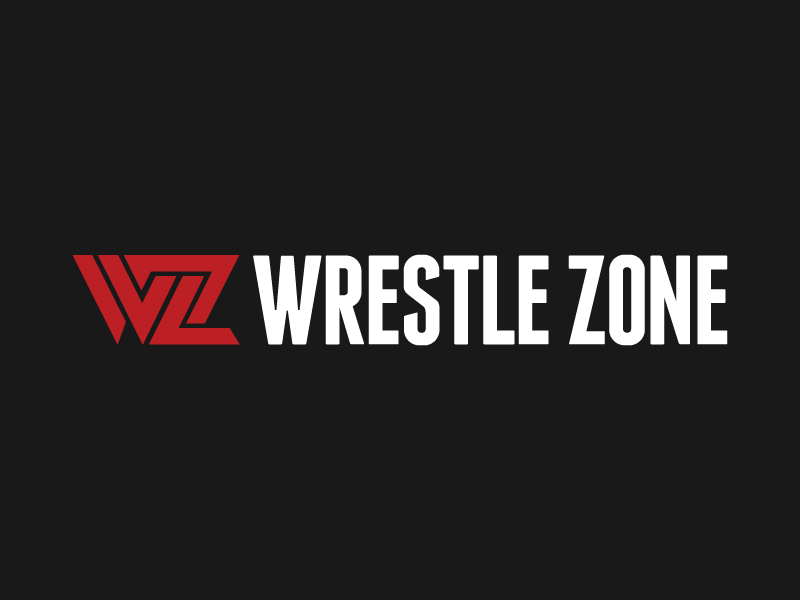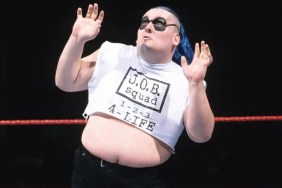Let the buyer beware. Always. Not of the quality, price or seller, but rather, wary of what it is they are buying. Supermarkets, malls and shopping channels are abundant with redundant, useless and frivolous items that seem to be bought en masse. And although marketing strategies have developed to a point that anything can be sold to anyone, we have to be held accountable for what we buy. We open the wallets, we swipe the magic plastic cards, and we take the objects home and leave them in their boxes. The symbiotic relationship between ridiculous purchases and the people who buy them is curious but is still enduring since its creation during the opulence of the 1980s. It is no coincidence that professional wrestling rose to mainstream popularity during the same period of luxury.
Only a small portion of a promotion’s profits are earned directly from ticket sales, the rest flow from concessions, video sales, and merchandise. The majority of these products inevitably lead a long life of storage and second hand stores. The more conventional products; DVDs, t-shirts, and action figures have been reliable money-spinners for decades, and marketing divisions brainstorm relentlessly in hope of finding the next outlet of consistent income. These brainstorms spew unholy spawn such as wrestling themed teddy bears, talking soap, flavored popcorn and compilation albums, leaving us to wonder who bought them and why. More recently, this trend has led to a WWE auction site, which has sold, among other things, used lingerie and trunks. Any avenue of potential profit, ethical or not, has been channeled directly into the pockets of the men in suits. And this is fine. As a company, their job is to maximize profits and utilize the resources available for fresh sources of money. However, the wrestlers themselves have come to the realization that it is their face that is responsible for the merchandise sales frenzy, using this school of thought to hawk a myriad of products after their departure from the limelight.
In a recent episode of Hogan Knows Best, Hulk unashamedly offered him and his family as faces for any product brought to their doorstep. Rather than returning for brief and glorious pay-per-view appearances, Hogan decided that self-merchandising would be a safer option, when he needs a little extra cash for the week. The episode identifies Hogan’s past product failures (a “Thunder Mixer”, which only sold 200,000) and the fresh successes in the making (an energy drink and grill). The most unsettling aspect is that Hogan himself has the minimum amount of input into the products, his demands for the energy drink was that it tasted satisfactory and that his cartoon illustration was realistic (the one decided upon depicting Hulk as an impending supernova of muscle). The exercise was driven solely by money. But this money-grabbing instinct isn’t exclusive to the Hogan household; it seems to have become a common mindset of all retired and balding superstars.
Be it Thunder Mixers, grills, vitamins, albums, burger joints, or reasonably auto-biographical novels, professional wrestlers are taking the initiative to earn amounts equal to those of their heyday, during their semi-retirement. For some, it is fueled by greed, stars like Hogan who clearly have a small fortune in the form of beach houses, Hummers, motorcycles and Segways, yet feel the need to accumulate more funds for to multiply these assets. For others, it’s essential for basic survival after being unceremoniously de-pushed or sacked, leaving them under qualified and blinded by the lingering stars in their eyes. So instead of working 350 days a year like they did previously, they manufacture their own image into easily digested consumables. And although seeing such blatant exploitation of us autonomous spenders, it’s difficult to pinpoint who the victim is, and why such things leave a bitter taste in the mouth of fans.
One reason could be that wrestlers teeter between “famous” and “celebrity”. While in one sense they are international household names, on the whole they are never imbued with the starry-eyed fascination that we have with tabloid celebrities. And so, they aren’t justified in using their fame as a selling point, because essentially they’re just really well known ordinary Joes. This is most evident when wrestlers cross the line and assume roles that are normally reserved for A-listers, in particular, movies. Time and time again, wrestlers have infiltrated the silver screen in hope of expanding their fame and bank accounts, infiltrations that have resulted in box office calamities and venomous criticism. It’s not difficult to see the justification; professional wrestlers are actors, except they have an audience that they engage and respond to. Films don’t have this shared energy, so without the atmosphere, the scatological vaudeville humour falls flat. The lowbrow schoolyard humour comes off as cheesy without the immediate collective audience reaction. Yet, the athletes don’t seem to learn from their mistakes and those of others, the factory line of lame wrestler film productions continues to produce flops such as Santa with Muscles, Suburban Commando, and Thunder in Paradise. Post-career wrestlers have no hesitation in surrendering their dignity for money. As fans who stubbornly choose to remember superstars for their greatest moments, seeing such a mammoth fall from grac, driven solely by a quick cheque forces us to see our idols succumb to most human desire, greed.
Another symptom of this grey area are swollen egos. Wrestlers, in their own minds, are warranted in having egos because they are famous, however, the population rebel against those who believe their own hype, especially when really, they are just guys. They could be anyone. This conflict has surfaced in various social arenas, often becoming aggressive and heated. Ultimate Warrior, who now speaks publicly on any topic (presumably he is qualified to have a definitive opinion on absolutely anything) was branded a lunatic after an episode where his homophobic sentiments (“queering don’t make the world work”) were challenged by the college audience. Such opinions would be controversial for the most beloved of celebrities, but when spouted from the mouth of a man whose career consisted of face paint and seizures, not only are they irrelevant but offensive in the way that he had the gall to be paid for them. Others such as Ludwig Borga and Ted Dibiase feel that their opinions are equally valuable. It is impossible, especially for casual fans, to take these men seriously and value their time as highly as they demand.
Granted, post-career self-importance has been successful, namely for The Rock. But The Rock’s case identifies the crux of the issue; his foray into the film industry came at the peak of his wrestling popularity as opposed to the tail end of a tapering legacy. His transfer was an honest expansion of his fanbase, whereas the commercial ventures of retired stars reek of desperation and self-compromise. Childhood heroes pawning their heroism. But the other option is even more disheartening, wrestling comeback runs. Each time an aged star returns, their current flabbier and wrinkled selves are superimposed over the images of them hung on posters in kids’ rooms. Not only do they clog rosters and squander funds, but also, such appearances cheapen their image more than any sub-par movie or Thunder Mixer would.
So while wrestlers need a steady income following their inevitably short and tolling careers, the avenues that are being taken are too ambitious, inappropriate or simply too far-fetched. The underlying self-importance of each, be it an energy drink, movie or opinion, seems to display that these superstars have forgotten how money is truly earned after years of inflated contracts and endless praise. A symptom of niche fame.
This behaviour is not unique to professional wrestling (although the short and sweet careers tend to breed it), anyone with a trace of fame milks it for their own profit. Movie stars, comedians, reality contestants or even newsworthy citizens, sell a little (or a lot) of themselves while their fame allows. It isn’t a sin. But the dilution of heroism is. And that is why seeing professional wrestlers succumb to the gluttony is all the more saddening. Actors act, with each film they depict a new persona, the individual and the work are separate, whereas, professional wrestlers spend decades building the one image of himself. An image of the True American Hero. So as a fan, particularly one who grew up with the product, to see your hero auction off his holy image for a few quick bucks is heartcrushing. This ignorance of their own legacy leaves the legacy in the hands of fans. The same fans buying Stone Cold Steve Austin teddy bears and leaving unsatisfied from Little Hercules in 3D.
If you would like to contact me, my email is TheButchershopColumn@hotmail.com.
Over and Out
Jim “The Butcher” Browne








